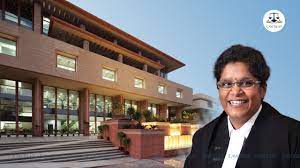“Mere Mistake in filing certificates cannot deprive a meritorious candidate of scholarship”: Delhi High Court

The Court stated that the purpose and intent of the concerned scheme is to empower the students of Scheduled Caste and Schedules Tribes to avail of top-class education opportunities.
Noting that the petitioner Law student had been meritorious in his first year as well as the second year of his course, Justice Prathiba M. Singh of the Delhi High Court observed that a mere mistake in filing an Income Tax Return (ITR) certificate instead of Income Certificate, could not deprive him of the scholarship.
“A mere discrepancy in filing the Income Tax Return instead of the Income Certificate, despite the two documents evidencing the same parameters of income requirements, cannot lead to a situation where an eligible meritorious candidate is deprived of the scholarship”, Justice Singh said.
The petitioner namely Bajrang joined the Rajiv Gandhi National University of Law for a five-year law course. He belonged to the Scheduled Caste category and wished to avail the Central Sector Scholarship Scheme of Top Class Education for SC Students.
Bajrang had to upload certain documents to avail the aforesaid scholarship, and on November 14, 2020, he filed the application along with his father's income tax return certificate. Upon verification, the Ministry rejected his application in September 2021, on the ground that the ITR certificate was invalid. The reason for rejection was that Bajrang instead of filing the “Income Certificate” had filed the ITR with an acknowledgment receipt.
After rejection, Bajrang in October 2021, addressed a reply email along with the Income Certificate for his application, to which the Ministry replied that the scholarship is being processed. Subsequently, after a few reminders, in November 2021, the Ministry stated that a change of documents is not permissible as it would change the merit list, thus, Bajrang’s scholarship was rejected.
Bajrang again next year applied for the scholarship i.e. for his second year in the course, and his candidature was found eligible. However, he had not been granted any scholarship, so he approached the court.
Dr. Amit George appearing for Bajrang contended that the authorities cannot take a hyper-technical approach when it comes to scholarships and similar schemes. He argued that the scheme should be read broadly in favor of granting relief to eligible students. George added that the University itself did not doubt the entitlement and eligibility of the candidate.
On the contrary, the counsel for the respondents submitted that Bajrang wrongly submitted the documents. He stated that all four slots that were allotted for scholarship students had been given to four other candidates, thus, the scholarship could not be granted.
Taking note of the submissions, the court stated that the purpose and intent of the Scheme are to empower the students of Scheduled Caste and Schedules Tribes to avail of top-class education opportunities and that the scholarship is awarded to meritorious students.
The court noted, “The Scheme is restricted to the top students in the inter se merit list based on the admission criteria. The University has confirmed in the recommendation set out herein above that the Petitioner was selected in the Merit List of 2020-21.”
“A hyper-technical approach obviously ought not to be taken in this matter. The Petitioner has also been diligent in replying, upon the discrepancies being pointed out by the Respondent. Thus, the Ministry ought to have considered the Petitioner’s candidature and ought not to have rejected the Petitioner’s application”, the court stated.
Accordingly, the court directed the Ministry of Social Justice and Empowerment to grant a scholarship to Bajrang, a law student under the “Central Sector Scholarship Scheme of Top Class Education for SC Students” within eight weeks.
Case Title: Bajrang v. Ministry of Social Justice and Empowerment & Anr.
